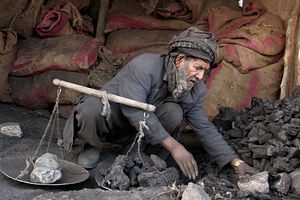Earlier this month, Voice of America’s William Gallo reported that the Afghan government was in the “advanced stages of negotiations” with U.S. companies interested in digging into the country’s coal resources. While far from the most valuable asset beneath Afghan soil, coal, the article noted was perceived by the parties as less controversial:
[Coal] is also less vulnerable to claims by Taliban insurgents that the Afghan government is colluding with foreign invaders to plunder the country’s natural wealth.
“We are cautious about this argument,” said the Afghan official. “That’s why we have chosen coal to begin with. If you win the confidence of the people when it comes to coal, then you can move on to other resources.”
The unnamed Afghan official is being a bit optimistic on two counts. First, that coal mining would bring the kinds of local benefits that would “win the confidence of the people.” Second, that coal mining projects with American companies wouldn’t be as vulnerable to Taliban claims of collusion as other projects.
On paper, coal mining looks like a sure bet. Afghanistan suffers from a serious energy shortage, with estimates that 70 percent of Afghans do not have access to reliable electricity. Afghanistan has active coal mines already, but as Gallo notes in the VOA article, “[T]he bulk of Afghanistan’s mining is off the books and illegal — overseen by warlords, politicians, or other politically connected individuals. As a result, very few taxes from the mining sector go to the cash-strapped Afghan government.”
With this in mind — that Afghanistan’s off-books mining (as well, presumably, as its on-books mining) is nevertheless overseen by not just warlords but politicians — consider recent complaints from residents of northern Samangan province who say they have not received the legally mandated 5 percent of revenues from coal mines in the province.
Pajhwok reported on February 26 that Samangan’s deputy provincial council head, Mohammad Hasham Sarwari, said that the relevant law — article 84 of the mining law to be specific — was not being enforced. The article stipulates that “The Ministry of Finance is responsible to pay five percent of the revenue collected from mines to the relevant province for economic, social and environmental improvement of the people of the province.”
Sarwari said the province should have seen at least 400 million afghanis (about $5.8 million) since 2015 but has not. If Sarwari’s complaints are grounded, one has to wonder where that money has gone.
Another piece of recent news is worth mentioning: over the weekend Afghan security forces reportedly killed nine Taliban and destroyed a Taliban checkpoint in Baghlan (which neighbors Samangan and also hosts coal mines). According to Khaama Press’ report, “The Taliban insurgents were using the check post to collect money from the vehicles carrying coal.” As the VOA articled noted, “Mining is the biggest source of revenue for the Taliban, after narcotics.” Some of that revenue comes in via checkpoints and simple extortion — the Taliban doesn’t attack the mine, they get a cut.
As Stephen Carter from Global Witness told VOA, “Afghanistan is not short of people digging stuff out of the ground… The problem is that when the extraction does happen it doesn’t benefit the government.” It also has not benefited the people, at least not enough for the kind of good will Afghan officials seem to hope will come with American-linked mines.
This brings us to the issue of the Taliban. The Taliban has espoused support for several development projects, most recently the Turkmenistan-Afghanistan-India-Pakistan gas pipeline but the Chinese Mes Aynak copper mine as well. These two projects both lack direct American involvement.
Though, to hear the Taliban tell it, the reason the Mes Aynak copper mine remains on paper is American meddling.
In a recent statement regarding the Taliban’s promise to not disrupt the construction of the TAPI pipeline, the Taliban warned:
[The TAPI project] is purely industrial and economic and the American invaders do not have any economic or military interests in it, therefore it is entirely possible that the Americans – for their vested interests – will create indirect problems for the project like how they created issues for the Mes Ainak (sic) project.
… The Americans can never tolerate any such project and program which is in the interest of the Afghans.
The Taliban statement goes on to propose a “pact of security and non-jeopardization from America” signed by the relevant parties, except Kabul, under the auspices of a respected organization like the United Nations, “otherwise it is not far that the said project will face similar delays as the Mes Aynak project due to American meddling.”
In 2007, the Afghan government signed a 30-year lease with a pair of Chinese companies for the rights to develop the Mes Aynak copper mine in Logar province. The $3 billion contract was hailed as the biggest foreign investment and private business venture in the country’s history. Over a decade later, however, China Metallurgical Group Corporation (MCC) and the Jiangxi Copper Company Limited have done little but push paper. In 2014, the Chinese partners began trying to renegotiate the deal, including reneging on building a railway, coal-fired power plant, and processing factory at the site as per the original agreement. By 2015, Beijing and Kabul were still deadlocked and little has changed since — except Shen Heting, the former general manager of the China Metallurgical Group Corp (MCC) who signed the original agreement, was expelled from the Chinese Communist Party for corruption.
The Taliban doesn’t need their claims of American interference or plundering to be true for them to hold some weight among Afghans anyway. Afghan history is permeated with very real — but also very imagined — foreign meddlers. While the Taliban has pledged to not attack TAPI or Mes Aynak, no such promise would be forthcoming for an American company digging coal in Afghanistan. That, if nothing else, is certain.

































